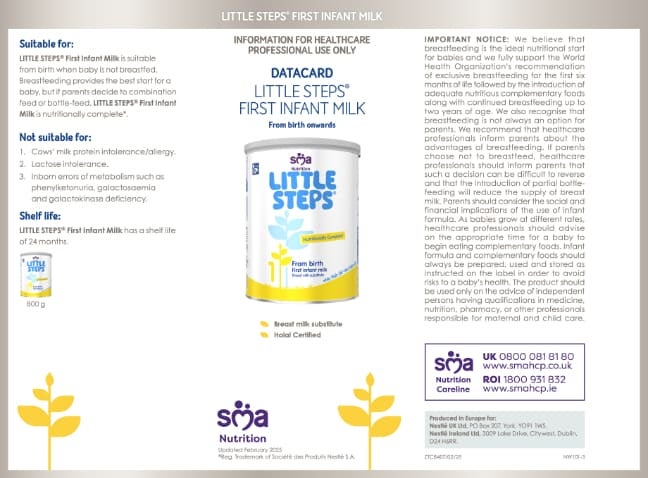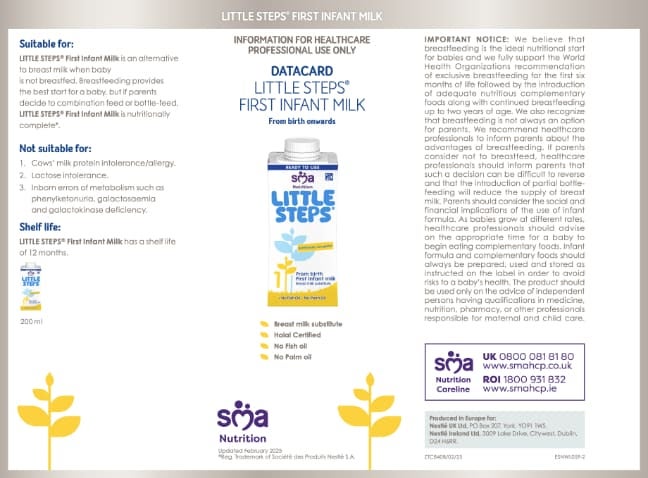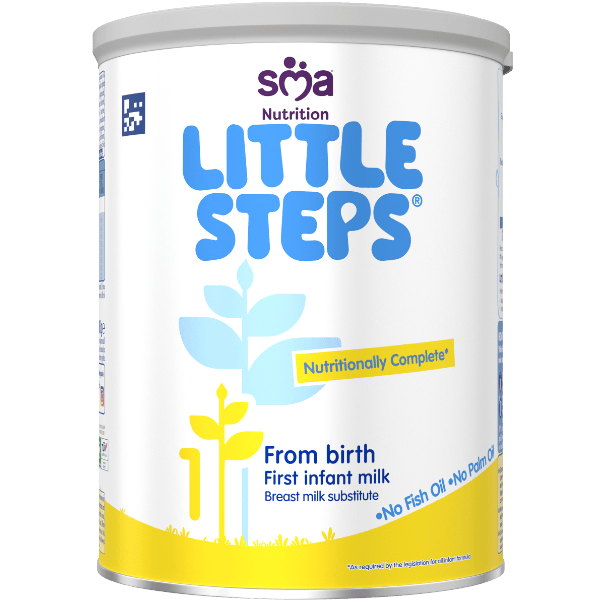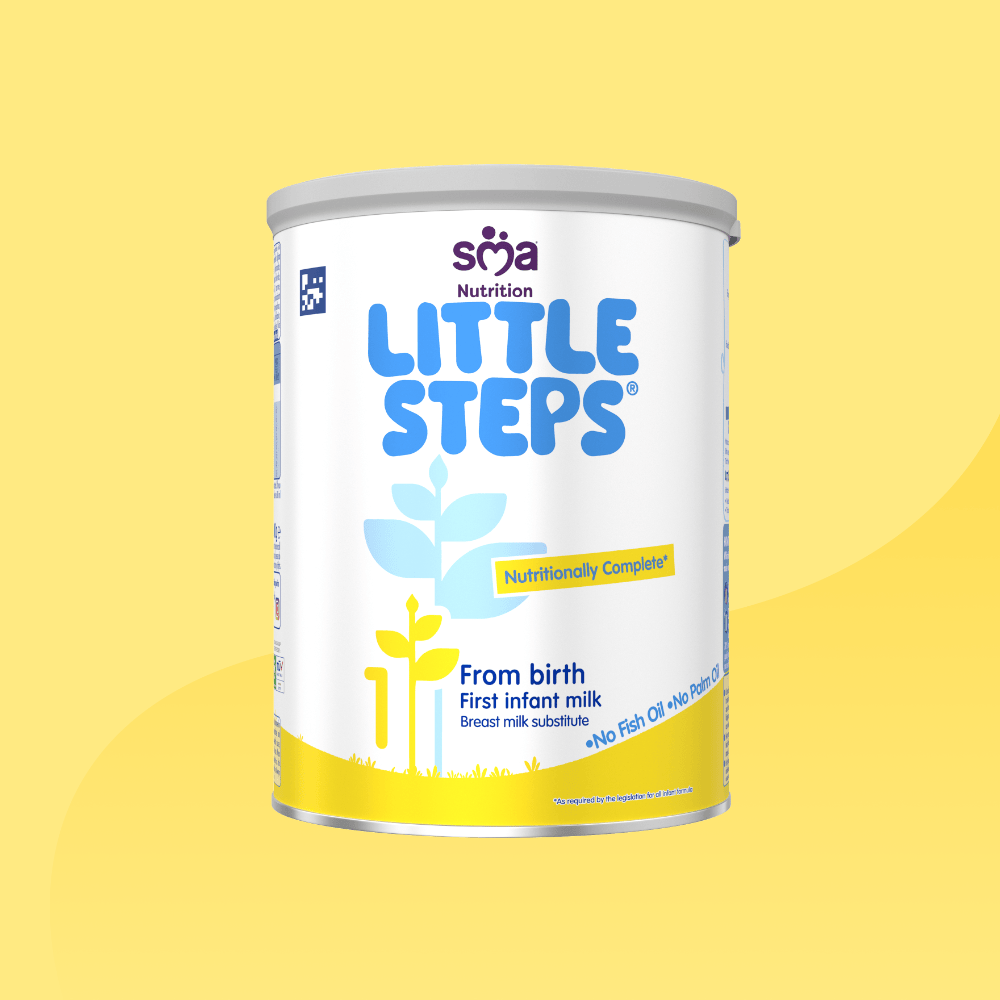LITTLE STEPS® First Infant Milk
A nutritionally complete formula milk suitable from birth, it can be used for those infants who are not being breastfed or those who are being combination fed.
Data cards

Download the powder format data card

Download the liquid format data card
Product details

LITTLE STEPS® First Infant Milk
800 g Powder
The scoop is provided under the lid. It can be stored in suspension inside the can.

LITTLE STEPS® First Infant Milk
Liquid Milk (200 ml carton)
Ready to Use resealable carton, which is easy to pour and can be kept in the fridge (5˚C or below) for up to 24 hours.
| Approx. age of baby | Approx. weight of baby | Preparation for single feeds | Cooled, freshly boiled water | Feeds in 24 hrs |
|---|---|---|---|---|
| ||||
| kg | Level scoops | ml | ||
| Birth – 2 weeks | 3.4 | 3 | 90 | 6 |
| 2 – 4 weeks | 3.7 | 4 | 120 | 6 |
| 4 – 8 weeks | 4.2 | 4 | 120 | 6 |
| 2 months | 5.3 | 5 | 150 | 5 |
| 3 months | 6.1 | 6 | 180 | 5 |
| 4 months | 6.7 | 6 | 180 | 5 |
| 6 months | 7.6 | 8 | 240 | 4 |
| 7 – 12 months | - | 7 | 210 | 3 |
- Do not add extra powder or water to make the feeds stronger or weaker and do not press powder into scoop. Using too much or too little powder can make your baby ill.
- We recommend preparing each feed in individual bottles when required.
- For hygienic reasons, discard unfinished feed in the bottle as soon as possible.
- For older babies, made-up formulae can be added to food.
- Do not alter or add to formulae unless medically directed.
- Do not warm feeds in a microwave, hot spots may occur and cause scalding.
- Remember, cows’ milk should not be used as a drink during the first year.
Preparation
How to prepare the baby's feed - powder
Whilst this product is made under strict hygienic conditions, it is not sterile. Failure to follow instructions on preparation and storage may make your baby ill.
- NHS (2017). Vitamin D. Available at https://www.nhs.uk/conditions/vitamins-and-minerals/vitamin-d/ (accessed April 2019).
- Food Safety Authority of Ireland (FSAI), (2007). Recommendations for a National Policy on Vitamin D Supplementation for Infants in Ireland. Food Safety Authority of Ireland, Abbey Court, Lower Abbey Street, Dublin 1.
- NHS (2016). Types of formula milk. Available at https://www.nhs.uk/conditions/pregnancy-and-baby/types-of-infant-formul… (accessed March 2019).
*Contains DHA (as required by the legislation for all infant formula)
DHA, docosahexaenoic acid.
LCP, long-chain polyunsaturate.
IMPORTANT NOTICE:
The World Health Organisation (WHO) has recommended that pregnant women and new mothers be informed on the benefits and superiority of breastfeeding – in particular the fact that it provides the best nutrition and protection from illness for babies. Mothers should be given guidance on the preparation for, and maintenance of, lactation, with special emphasis on the importance of a well-balanced diet both during pregnancy and after delivery. Unnecessary introduction of partial bottle-feeding or other foods and drinks should be discouraged since it will have a negative effect on breastfeeding. Similarly, mothers should be warned of the difficulty of reversing a decision not to breastfeed. Before advising a mother to use an infant formula, she should be advised of the social and financial implications of her decision: for example, if a baby is exclusively bottle-fed, more than one can (400 g) per week will be needed, so the family circumstances and costs should be kept in mind. Mothers should be reminded that breast milk is not only the best, but also the most economical food for babies. If a decision to use an infant formula is taken, it is important to give instructions on correct preparation methods, emphasising that unboiled water, unsterilised bottles or incorrect dilution can all lead to illness.





